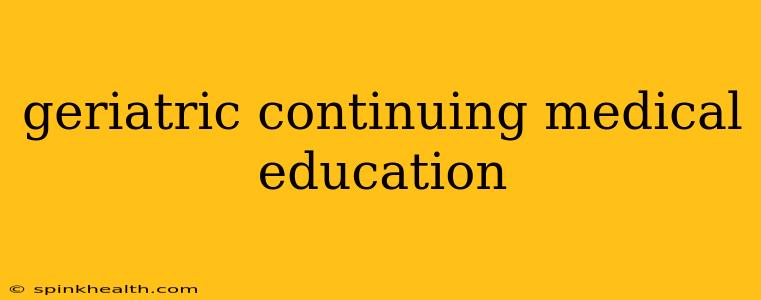The world is getting older. This isn't just a demographic shift; it's a seismic change impacting every facet of healthcare, particularly the need for robust and up-to-date Geriatric Continuing Medical Education (CME). As physicians, nurses, and other healthcare professionals caring for an increasingly elderly population, staying current with the latest advancements in geriatric care isn't just important – it's crucial. This isn't just about ticking boxes for licensing; it’s about ensuring the best possible quality of life and care for our aging patients. My journey into this field began with a simple observation: the unique challenges of geriatric care often went unaddressed in standard medical training. This spurred my commitment to exploring the ever-evolving landscape of geriatric CME.
What is Geriatric Continuing Medical Education?
Geriatric CME focuses on providing healthcare professionals with the knowledge, skills, and attitudes necessary to provide high-quality, patient-centered care for older adults. It covers a vast spectrum of topics, from the physiological changes associated with aging to the psychosocial and ethical considerations involved in end-of-life care. This isn't simply a recap of basic medical knowledge; it delves into the complexities of multiple chronic conditions, polypharmacy, and the unique challenges of caring for a population with diverse needs and vulnerabilities. The goal is to equip healthcare providers to effectively address the multifaceted healthcare needs of older adults, improving both their physical and mental well-being.
Why is Geriatric CME Important?
The importance of geriatric CME can't be overstated. The unique challenges presented by aging necessitate specialized training and ongoing professional development. Older adults are more likely to have multiple chronic conditions, increasing the risk of medication interactions (polypharmacy) and complex treatment plans. Understanding age-related changes in physiology, cognition, and social circumstances is fundamental to providing effective and compassionate care. Neglecting this specialized training can lead to suboptimal care, decreased patient outcomes, and increased healthcare costs. It's about equipping ourselves with the tools to navigate the complexities of this ever-growing patient population.
What Topics are Covered in Geriatric CME?
Geriatric CME encompasses a broad range of topics critical to providing comprehensive geriatric care. These often include:
-
Age-related physiological changes: Understanding how different organ systems change with age is fundamental to diagnosing and treating age-related illnesses.
-
Common geriatric syndromes: Geriatric CME explores common conditions like frailty, falls, delirium, dementia, and urinary incontinence, equipping healthcare professionals with the skills to diagnose and manage them.
-
Polypharmacy and medication management: Older adults frequently take multiple medications, leading to potential drug interactions and adverse effects. Geriatric CME emphasizes safe and effective medication management strategies.
-
Cognitive impairment and dementia care: Dementia is a growing concern, and geriatric CME provides training on diagnosis, management, and caregiving strategies for individuals with dementia.
-
Palliative and end-of-life care: Preparing for end-of-life care is crucial, and geriatric CME focuses on providing compassionate care and support to patients and their families during this challenging time.
-
Ethical and legal issues in geriatric care: Geriatric CME addresses the complex ethical and legal challenges associated with caring for older adults, such as decision-making capacity, advance care planning, and elder abuse.
What are the Different Formats of Geriatric CME?
Geriatric CME is offered in various formats, including:
-
Online courses and webinars: Convenient and flexible options allowing professionals to learn at their own pace.
-
In-person workshops and conferences: Provide opportunities for hands-on learning, networking, and interaction with experts.
-
Journal clubs and case studies: These interactive sessions facilitate discussions and critical analysis of current research and clinical practice.
-
Mentorship programs: Experienced geriatricians guide and support healthcare professionals early in their careers.
How to Find Geriatric CME Opportunities?
Numerous organizations offer high-quality geriatric CME opportunities. Professional medical associations, universities, and hospitals frequently provide courses, conferences, and other learning resources. Online platforms also offer a wide range of geriatric CME programs. It’s crucial to look for accredited programs to ensure the quality and relevance of the content.
What are the Benefits of Geriatric CME for Healthcare Professionals?
The benefits of pursuing geriatric CME are multifaceted:
-
Improved patient care: Enhanced knowledge and skills lead to better diagnoses, treatment plans, and overall patient outcomes.
-
Increased job satisfaction: Staying current and mastering the complexities of geriatric care can boost job satisfaction and professional fulfillment.
-
Professional advancement: Geriatric expertise is highly sought after, and CME demonstrates a commitment to professional development, which can open doors to new opportunities.
In conclusion, geriatric continuing medical education is not merely a requirement; it's a critical investment in the future of healthcare. As the aging population continues to grow, our commitment to ongoing learning and professional development in geriatric care is essential to providing compassionate, effective, and high-quality care for our older adults. The journey is ongoing, and the rewards – both personally and professionally – are immense.

